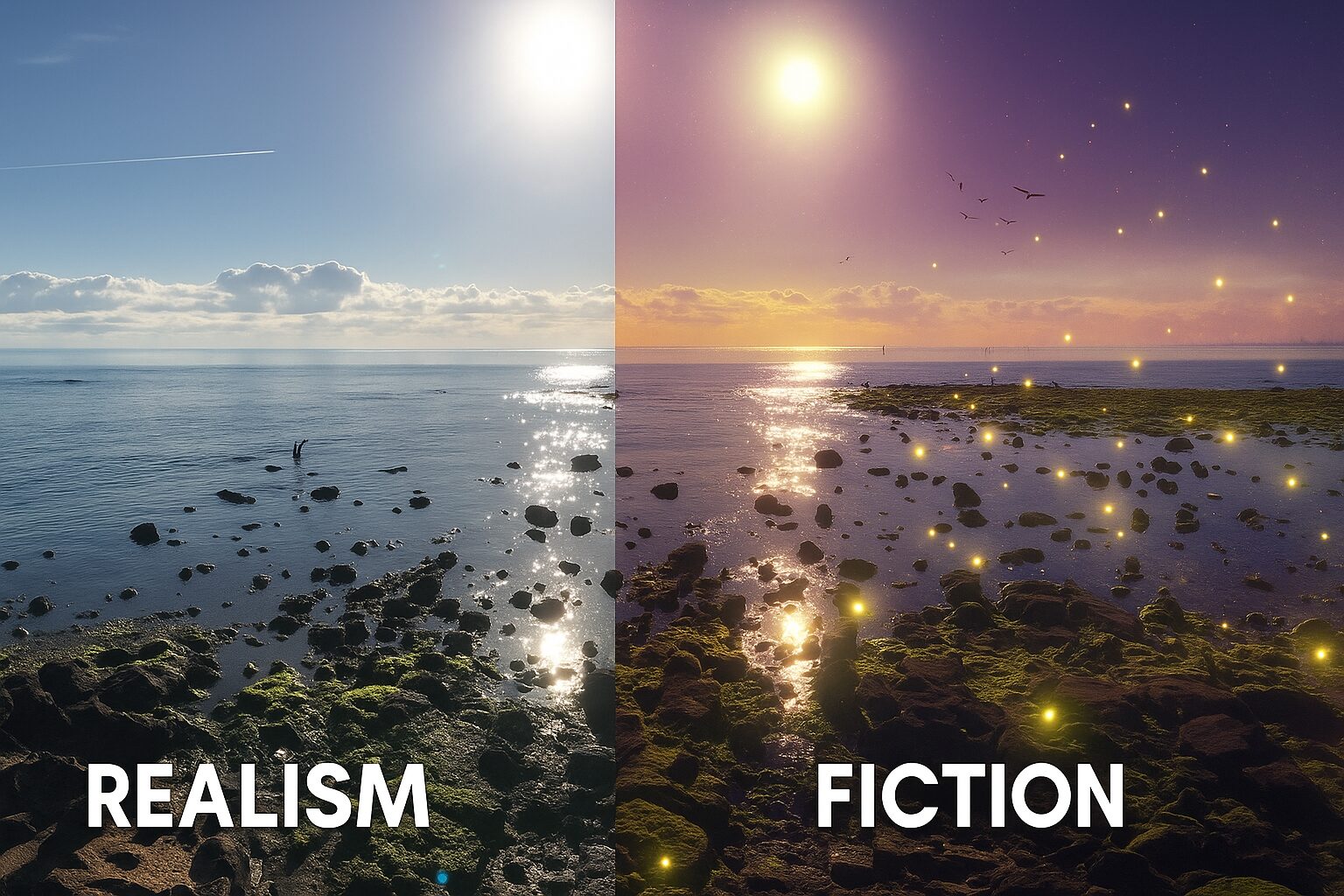I know, before you ask, it may seem as if I’m contradicting myself, because realism in fiction sounds like an oxymoron when the point of fiction is to escape reality, right? But stick with me here. There’s more nuance to it than just escaping reality.
Let’s talk about realism in fiction.

Fiction, by definition, doesn’t have to follow the rules of the real world. And yet, readers still expect some level of believability. So where do you draw the line? When do you stay grounded, and when do you float off into the fantastical?
From my viewpoint, I believe realism is just another tool while writing fiction, rather than a requirement. It’s something you use in a story to either ground your world, heighten emotions, or help readers connect to what’s happening.
Let me give you an example. Say you’re writing a touching scene about an animal character. Let’s go with a sea creature that doesn’t actually have eyelids or an expressive mouth. But for the sake of emotion, you write them blinking away tears while frowning. Is that scientifically accurate? No. Does it take away from the story? Also no. Because in that moment, your goal isn’t biology. It’s emotional resonance. If giving that creature the ability to show emotion helps the reader feel more deeply, that’s what matters.


Let’s be honest, how many of us cried when Simba nudged his father in The Lion King? Lions don’t have expressive eyebrows or tear ducts the way humans do. But animation gave them those features to connect to our emotions. That’s part of why the original cartoon hit so hard, and why the live-action remake didn’t quite have the same punch. The realism dulled the emotional weight.

When realism gets in the way of the heart of the story, bend it.
But that doesn’t mean throw it out completely.
Some stories thrive when they’re rooted more deeply in reality. A political thriller, for example, needs a sense of plausibility to be effective. Same with historical fiction. The more grounded the setting, the more careful you have to be with what you choose to exaggerate or invent.
On the flip side, if you’re building your own world from scratch, like I am in my current novel, you get to make the rules. My story takes place in a completely original universe with its own spiritual systems and world structure, so following the rules of our reality too closely would actually hold it back. Trying to stay too realistic would strip away the magic that makes my world unique. But I still keep emotional realism in mind. I want readers to relate to my characters. To cry with them. To cheer with them. To understand their pain.
That’s the balance.

Take Jurassic Park, for example. It’s a story that thrives on being grounded in realism. The science may be fictional, but it’s rooted in enough reality to make us believe that cloned dinosaurs could exist. That realism is what gives the story its weight. The horror and tension wouldn’t hit as hard if everything felt too far-fetched.

Now contrast that with the Marvel universe. While some of their stories also begin grounded, the repeated bending of their own rules, like reversing time or resurrecting fallen heroes, has weakened the stakes. If your favorite hero dies in a climactic battle but comes back in the next comic or movie, the emotional weight disappears. Even if the in-universe logic explains it, the overuse makes the audience feel like no one truly stays gone. And once that happens, it’s harder to stay invested.
So it all depends on what story you’re trying to tell. Think about the context of your plot, your setting, and your goals. Are you creating a new universe from scratch? Are you trying to mirror our real world? The level of realism you need depends entirely on the foundation your story provides.
Understanding how to use realism in fiction is part of what makes your writing feel believable and compelling.
Bend the physical rules when you need to. But never lose the emotional truth. Fiction is all about making the unbelievable feel real enough to matter.
So, whether your talking fox blinks or your fantasy character performs the impossible in a key moment, ask yourself:
- Does this choice help the story?
- Does it deepen connection?
- Does it stay true to the emotional core of your characters?
If the answer is yes, then break the rules.
Let your fiction breathe with or without realism.
What’s a moment in fiction where bending realism enhanced the story for you? Drop it in the comments. I’d love to hear your favorite rule-breaking moments!


Leave a Reply